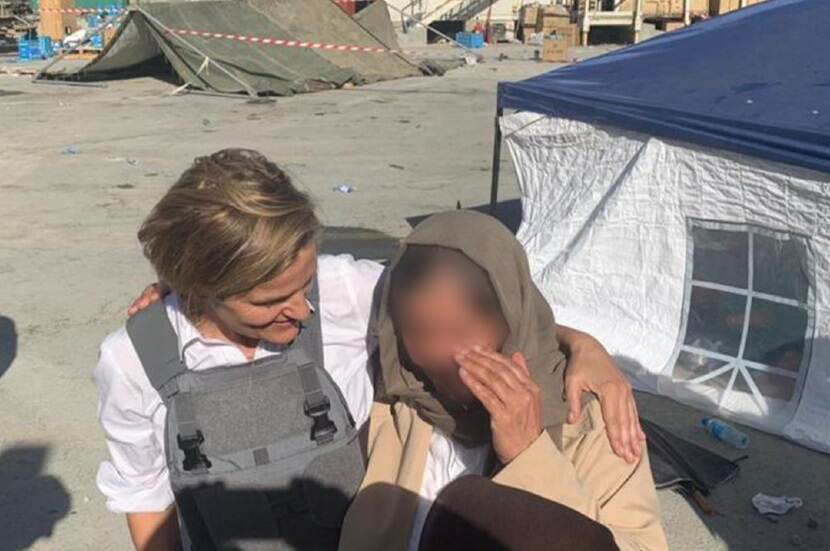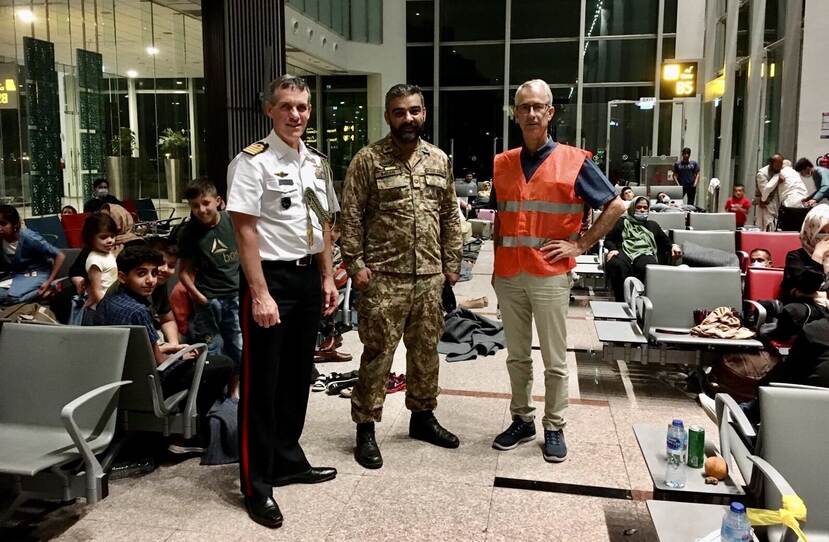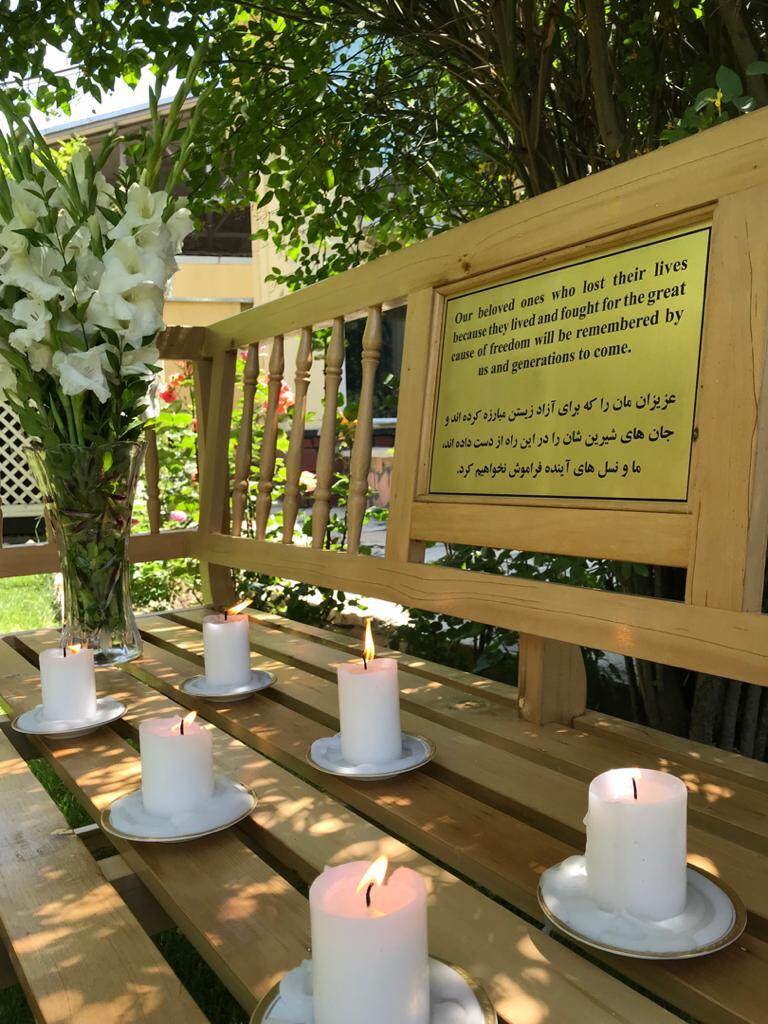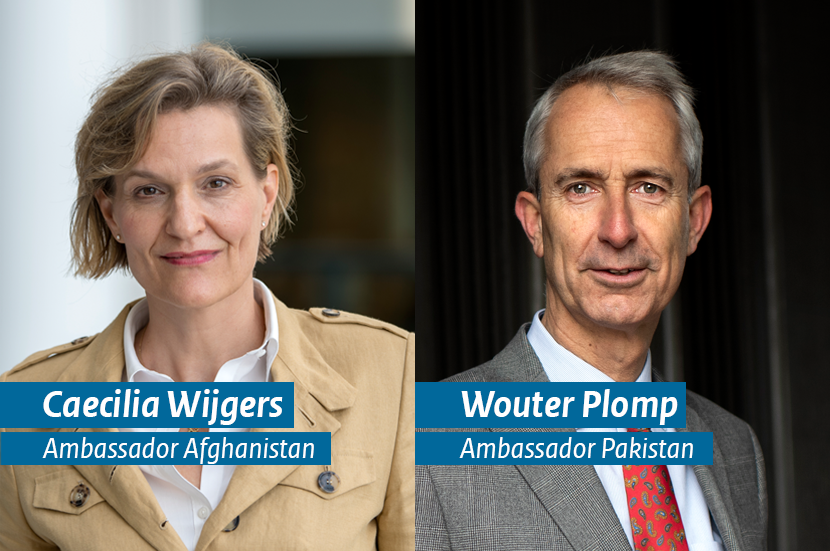An interview with our ambassadors to Afghanistan and Pakistan: one year after the fall of Kabul
Since 15 August 2021 Afghanistan has been in the hands of the Taliban. A year later, two ambassadors who experienced the upheaval at first hand are leaving their positions: Caecilia Wijgers, ambassador to Afghanistan, and Wouter Plomp, ambassador to Pakistan. In this article they look back on events in and around Afghanistan and look ahead to the region’s future.
Caecilia Wijgers, ambassador to Afghanistan
‘My time as ambassador to Afghanistan can be summed up in two words,’ says Caecilia. ‘Before and after. And the turning point was the Taliban’s takeover of Afghanistan and the ensuing evacuation operation. I often reflect on the events that led up to 15 August, the scene at Kabul airport, and the aftermath of it all, in the Netherlands as well as Afghanistan. I can still vividly recall the feeling I had after the fall of Kabul: disbelief, shock, the sense of living through a historical turning point. Before the withdrawal of the US and NATO troops we and some other like-minded countries had jointly prepared for various scenarios. But given the rapid momentum of events, we ended up having to deal with the worst-case scenario.’
‘My time as ambassador to Afghanistan can be summed up in two words: before and after.’

Afghanistan: the current situation
‘The situation in Afghanistan is deeply troubling. The country is in a serious economic and humanitarian crisis, under a regime that has not yet been recognised by a single country. The Taliban is internally divided, and among the Afghan population it lacks legitimacy. Individual freedom is under pressure, and the impact on women has been particularly great: they’re literally being banned from public life. And secondary education is still not open to girls.’
‘The task I was given at that time in Kabul hasn’t changed. But it’s only grown more difficult.’
‘The task I was given at that time in Kabul hasn’t changed: help to stabilise Afghanistan. The Netherlands continues to support the Afghan people. But humanitarian aid alone is not enough. Investing in self-reliance, defending human rights, supporting civil society, fighting terrorism and continuing to engage in dialogue with the Taliban – all these things are essential. So my mission has only become more difficult. Not only because the Taliban is in power but because the embassy team has had to do its work remotely for the past year.’
Transporting people out of Afghanistan
Since the Taliban took power, the Netherlands has been working hard to transport eligible individuals from Afghanistan to the Netherlands as quickly as possible. ‘After the acute evacuation phase in Kabul, a dedicated transportation task force was set up in The Hague to coordinate activities at our embassies. Working together, they’ve succeeded in finding alternative routes via Pakistan, Iran, Qatar and the United Arab Emirates. In this way it’s been possible to bring people still in Afghanistan to the Netherlands. I’m very grateful to all these colleagues – after all, this is no easy task. And the same goes for Wouter’s activities in Pakistan.’
Wouter Plomp, ambassador to Pakistan
The only way to get people to the Netherlands from Afghanistan is via a neighbouring country. ‘This is because the Netherlands has no official ties with the Taliban regime,’ Wouter explains. ‘And so after the fall of Kabul, in addition to being the ambassador to Pakistan, I ended up spending half my time as the “evacuation ambassador”. This is still a major challenge, as the embassy has had to ask a lot of Pakistan. For example, we needed the Pakistanis’ permission to use a section of the airport for evacuation flights and to land military aircraft there, and we also needed their help to provide temporary accommodation for refugees. It’s as if a foreign country were to ask the Netherlands, ‘Hey, do you mind if we use part of Schiphol Airport?’
‘It’s as if a foreign country were to ask the Netherlands, ‘Hey, do you mind if we use part of Schiphol Airport?’
‘We’ve also asked Pakistan to admit people to the country without a passport. The agreement is that we inform the Pakistani authorities as fully as possible about the individuals in question, and then they’re allowed to cross the Pakistani border. Because we’re asking more and more of Pakistan, it’s vital to ensure that this cooperation and courtesy cuts both ways. I’ve been deeply impressed by the tremendous hospitality and helpfulness of the people here.’

Contribution of the embassy in Pakistan
‘It’s the Dutch embassy’s job to ensure accommodation is available here in Pakistan for people who are entitled to travel to the Netherlands from Afghanistan. We arrange buses to pick them up at the Afghan border. We make arrangements for them to stay in guesthouses, which my colleagues and I regularly visit, to stay in touch and to offer encouragement if the process takes longer than expected. This is an operation that’s still very much ongoing. A lot of people are working very hard on it, both at the embassy and in The Hague. In the past six weeks alone over 600 Afghans have arrived in Pakistan.’
A promise to the Afghan people
After leaving Afghanistan, Caecilia worked from Qatar. ‘We held team days with embassy staff to reflect together on what had happened. This was something we all needed, not least because we’d had to say goodbye to our evacuated local colleagues who now had to re-build their lives in the Netherlands. It was painful for everyone. Afghanistan does something to you; it gets under your skin. But at the same time, the new situation is a strong motivation to push ahead. We promised that we would not abandon the Afghan people. Together with other countries, the Netherlands has sought to honour this promise for over 20 years. Twenty-five members of the Dutch armed forces lost their lives in Afghanistan. And then there are all the Afghans who fought to make their country more stable and democratic, at a high cost.’
Afghanistan: looking to the future
‘We can’t look too far into the future. The situation in Afghanistan is always evolving. But we’re still fully engaged. After the mass exodus that followed the Taliban’s takeover, new heroes have arisen in Afghan society: young people, women. We want to support their efforts to be heard. Ultimately, change in Afghanistan must come from the inside, through dialogue between Afghans. That’s the key.’
‘This isn’t the same Afghanistan that was conquered by the Taliban in the late 1990s.’

‘We need to realise that the Netherlands’ efforts are important and will remain so. A stable Afghanistan will also make our country safer. We cannot allow the country to become a base of operations for international terrorism again. This isn’t the same Afghanistan that was conquered by the Taliban in the late 1990s, even though the repressive measures they’ve taken are reminiscent of that period. Many Afghans have a different mindset now, and that includes the women leaders in the provinces who have stayed on. All this is going rise to the surface at some point. It’s practically inevitable. It’s just a matter of a time, and it will require patience. I also hope that Dutch people will continue to offer support to Afghans in the Netherlands; it’s worth remembering that they’d rather be home too. Having to restart your life in a new place is extremely difficult.’
Two ambassadors say farewell
Caecilia Wijgers and Wouter Plomp are both moving on to other things. Caecilia stepped down as ambassador on 26 July, and is now on a six-month sabbatical. Wouter left Pakistan on 13 August. In September he will start his new posting as ambassador to Nigeria.
Wouter Plomp: ‘Saying goodbye is always difficult, but in my three years in Pakistan I was able to achieve some things for the Netherlands. Pakistan plays a key role in the region, and we sorely needed their help to evacuate people from Afghanistan. It was hard work, but at the same time deeply gratifying. Through the embassy I was able to offer tangible help to people whose work in Afghanistan made them eligible to relocate to the Netherlands. Without the help we received from Pakistan and other neighbouring countries, this wouldn’t have been possible. Next year the Netherlands and Pakistan will celebrate 75 years of diplomatic relations. Hopefully, we can also strengthen our partnership with Pakistan in other areas as well – trade, agriculture and cultural ties, for example.’
Caecilia Wijgers: ‘Diplomacy is a special profession. It’s a privilege to be a diplomat and serve the Netherlands. You have a mission, and you do your best to complete it with all the tools at your disposal – giving up is not an option. The solidarity we experienced during the crisis, working alongside so many colleagues, both civilian and military, was extraordinary. That support enabled me to give my all. I emerged from it as a stronger person. Now it’s time to let the adrenaline subside a bit before I continue. Afghanistan will remain part of me, but now I’ve handed over the reins to my worthy successor, Emiel de Bont.’
